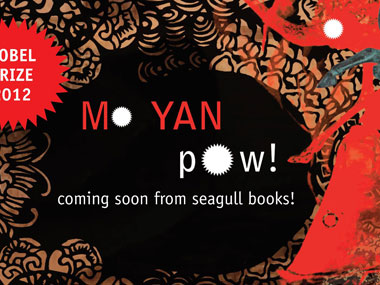by Bishan Samaddar
Last year Mo Yan sent my boss a picture of his newly born granddaughter. She looked exactly like Mo Yan. It seemed as if he had been born again. Perhaps he was. Perhaps he is always being born or, at least, is refusing to grow up. When last month I started reading the forthcoming English translation of his novel POW!, I realized why.
I have little knowledge of Chinese literature. Much like Salman Rushdie, who confessed on Facebook that Mo Yan’s Red Sorghum has been lying unread on his bookshelf for ages, I have not had much inclination to pick up Chinese books. Few are available in good English translations. Only when Seagull Books, the publishing house I work for, decided to bring out an English translation of Mo Yan’s new novel POW! did I dive into this phantasmagoria.
In POW! Mo Yan writes in the voice of a child. The narrator is adult, he has decided to become a Buddhist monk, but his childhood has not left him. He recounts his experience of childhood to a certain silent Wise Monk in a ruined temple; his story flows uncontrollably. ‘Verbal diarrhea’, that disgusting cliché that I have always hated, now begins to make sense. Make no mistake about it—the flow in POW! is not just verbal. Having mostly read very middle-class-friendly books, where even the most passionate sex is prettified and lifted above the dailiness of life, POW! is most disconcerting in its obsession with the physical and the vulgar. The brutal genius of Mo Yan lies not just in making you identify with characters and situations as all great literature does but also in his refusal to omit the minutest, ugliest, most embarrassing detail of any experience. The ugliness makes the experience eerily intimate:
[T>he old woman hobbled up to me, took a piece of turnip from her mouth and stuffed it into mine. That was sort of revolting, I don’t deny it. But thoughts of how pigeons exchange food turned revulsion into intimacy. I was reminded of something that had occurred in the past. It was back when my father had gone off to the northeast and Mother and I were surviving by dealing in scrap. We were taking a break at a roadside stall. . . . A blind couple with a chubby, fair-skinned baby were eating at the stall. The baby, obviously hungry, was crying. The woman, hearing my mother’s voice, asked if she would feed the baby. So Mother took the baby from her and a hard biscuit from the man, which she chewed into pulp before feeding him mouth to mouth. . . . I swallowed the turnip the old woman had put in my mouth and suddenly felt sharp-eyed and clear-headed.
I have seen this happen in my country, in my culture, on the streets, on the trains. But I have never read it in a book. Realism is newly defined, all its orifices gaping wide.
Mo Yan is fixated on orifices. Sex, urinating, defecating aside, there is endless eating. The narrator tells us that he has had an impoverished childhood, bereft of meat, in a village famous for its meat-processing plant. There is hardly anything that is not eaten in this novel—chicken, duck, sheep, goat, dog, pig, cow, horse, donkey, ostrich. Everything swirls in a stew being prepared by the cook Huang Bao in a huge pot at the meat-processors:
Huang Biao snared a pig’s knuckle and examined it. What was he looking for? It was soft and fully cooked, and would be overdone if he let it stew any longer. But he threw it back in, picked out a dog’s leg, and went through the same drill, but this time he sniffed it. What are you doing, you moron? It’s ready to eat, so turn down the heat before it turns mushy. Next came a sheep’s leg, and once again it was examine and smell. Why don’t you taste it, you moron? . . . Now that the heat had diminished, the liquid was no longer roiling, although a few ripples remained in the spaces between the cuts of meat, whose song had softened as they waited to be eaten.
Sounds digestible, I suppose. Almost. Till the narrator carries on with Huang Biao does next:
He moved a stool up to the pot, climbed onto it, undid the buttons of his pants, took out that demonic tool of his and released a stream of yellow piss into the meaty mixture. . . .
Huang Biao picked up a small copper ladle, scooped up some of the liquid, and held it under his nose. With a satisfied smile, he said aloud:
‘Just right. Now, you bastards can dine on my piss. . . . The ancients have said, “What the eye does not see cannot be dirty.” Don’t you agree? If you want the truth, the addition of urine makes the meat fresher and more tender. What you saw as urine is really fine cooking wine.’
Advertisement
Mo Yan’s reality is unique and universal because nothing in it is deleted. Everything coexists, in a harmony most perverse.
The pitch of life depicted in POW! is all too familiar to us Indians—there is eating, and there is vomiting; love and fornication, but also peeing and farting; passionate embraces but also the foulest of abuses; and the impossibly crude sentimental longing that one feels for one’s family. We often try not to notice the most physical aspects of this life but without them that life is pathetically incomplete.
Reading POW! I realized that the crucial thing about life is its irrationality. In a world saturated with Western narratives in which everything happens for a reason, Mo Yan is freedom. His characters have motives that are totally unfounded in reason; they are led to immense violence as well as complete renunciation in a world that we would hate to see as real but, unfortunately, is entirely real. Mo Yan has none of the fanciful flights that you encounter in Gabriel Garcia Marquez; he is a dark but hilarious continuing slapstick, a bawdy and bloody Buster Keaton. His fiction pushes its way up like grain through parched soil. And it does so only because the tale needs to be told.
In his very brief afterword to the novel, Mo Yan tells us that narration is everything, it is the only way we humans have of dealing with the cruel passage of time:
The story line of POW! isn’t all that meaningful. Throughout the novel, narration is the goal, narration is the theme and narration is its construct of ideas. The goal of narration is narration. But, if I were forced to make a story out of this novel, I’d settle for the story of a boy prattling on and on about a story.
As readers, we cannot disagree either. We tell stories to ourselves all the time. That is how we make sense of things, knowing well that nothing ultimately makes sense.
Welcome, newly born reader of Mo Yan, to this world, a savagely comic world that is just like your own; you are familiar with it but it is being retold by someone else. It just happens that the name of that storyteller means ‘Don’t Speak’.


)




)
)
)
)
)
)
)
)